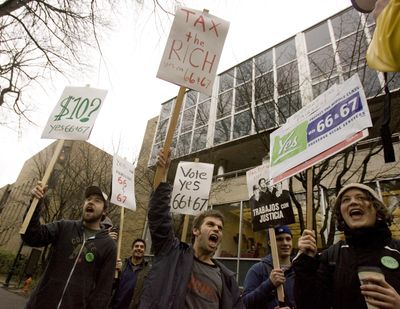Nation’s eyes turn to Oregon tax vote

PORTLAND – If any Americans are willing to fork over more to state governments in 2010, it might just be those of Oregon, where voters are deciding the fate of two proposed tax increases that target the wealthy and corporations.
Oregon voters the past two weeks have been marking referendum ballots on two tax issues, one raising rates on people who make more than $125,000 a year in taxable income – $250,000 for joint filers – and on businesses, many of whom pay a minimum tax of $10 a year.
The mailed-in and dropped-off votes will be counted Tuesday. The results are likely to be part of the national spin cycle the next morning and could give legislators in other states a hint about whether they can ask taxpayers for help in repairing ravaged budgets.
The only independent polls made public so far show the tax increases ahead but with shrinking margins. If they pass, that would be a break with history. Despite Oregon’s reputation for left-leaning politics, voters have often shot down tax measures.
But if the poll results prove out, “I think that would bode well for Arizona’s efforts to balance our budget,” said Phoenix political consultant Doug Cole.
Cole is running an election campaign for Republican Gov. Jan Brewer, who has proposed a temporary sales tax increase in the face of fierce opposition in her own party. She’s running to keep the office she inherited as secretary of state when Democrat Janet Napolitano joined the Obama administration, and she faces strong competition in the primary.
Here and there in legislative sessions just getting under way in January, leaders have talked about or pushed tax increases, as in Arizona, Illinois or Washington state.
“What we hear over and over again from the states is that everything is on the table,” said Arturo Perez, a fiscal analyst for the National Conference of State Legislatures.
Oregon’s tax increases came out of a legislative session last year in which Democrats with commanding majorities pared the budget, deployed some reserves, parceled out federal stimulus dollars, and tiptoed around tax increases that would have hit large numbers of Oregonians.
They assumed any tax measures would be referred to the voters, as is routine in Oregon, and would face difficulty, as is also routine.
Nine times since the 1930s, for example, Oregon voters have rejected sales tax proposals, leaving the state government relying primarily on income taxes at some of the highest rates in the nation and secondarily on lottery proceeds. Twice in the past decade, voters have rejected broad-based income tax increases. In 2007 they rejected higher taxes on cigarettes, whose revenue would have been used to provide health insurance for children.
So, legislative leaders crafted tax packages that by state estimates would hit about 2 percent of the top earners and put the biggest bite on corporations, many based out of state, with the largest amount of sales.
“These increases are more carefully focused on those who have resources in order to protect services for everybody,” said Democratic Rep. Dave Hunt, speaker of the Oregon House.
The measures were referred to the voters by business leaders, and the resulting campaign has seen them duking it out with the unions representing teachers and state workers.
The business campaign featured contributions from the likes of Phil Knight of Nike and Tim Boyle of Columbia Sportswear. But business interests haven’t had a united front, and some high tech companies, fretting about the education system they rely on for workers, have stayed on the fence.